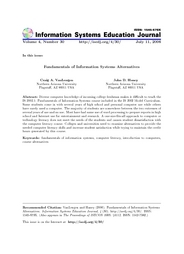Volume 4
Volume 4, Number 30 |
July 11, 2006 |
Abstract: Diverse computer knowledge of incoming college freshman makes it difficult to teach the IS 2002.1: Fundamentals of Information Systems course included in the IS 2002 Model Curriculum. Some students come in with several years of high school and personal computer use while others have rarely used a computer. The majority of students are somewhere between the two extremes of several years of use and no use. Most have had some use of word processing to prepare reports in high school and Internet use for entertainment and research. A one-size-fits-all approach to computer or technology literacy does not meet the needs of the students and causes student dissatisfaction with the computer literacy course. Colleges and universities need to examine alternatives to provide the needed computer literacy skills and increase student satisfaction while trying to maintain the credit hours generated by this course.
Keywords: fundamentals of information systems, computer literacy, introduction to computers, course alternatives
Download this issue: ISEDJ.4(30).VanLengen.pdf (Adobe PDF, 9 pages, 435 K bytes)
Preview the contents: VanLengen.j.txt (ASCII txt, 22 K bytes)
Recommended Citation: VanLengen and Haney (2006). Fundamentals of Information Systems Alternatives. Information Systems Education Journal, 4 (30). http://isedj.org/4/30/. ISSN: 1545-679X. (A preliminary version appears in The Proceedings of ISECON 2005: §4112. ISSN: 1542-7382.)
